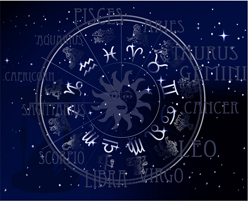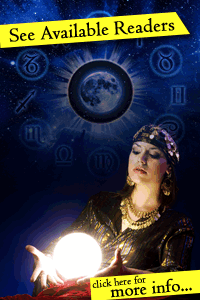Credit Card Callers
Operator Assist
Available 10 am till 6pm daily AET for bookings and Issues.
Billed as Access Positive
*You must accept our Terms of Use
Money Back Guarantee
If you are not 100% happy with the reading we will give you a Full Refund. Available for credit card clients through the auto and manual credit card service. Please call the Helpdesk on 1800 222 362.

History of Horoscope
Most people today already know what a horoscope is, and many perhaps would be scanning the newspapers or magazines to take a peek at their birth signs, and see their daily or weekly fortunes. But regardless of whether you’re horoscope sign is a Scorpio, Libra, Sagittarius or anything else, do you know the history and origins of horoscopes?

A long time back when there was no formal education to provide reliable information, people looked towards the stars in the sky to find the answers to some perennial questions about their survival. We still do the same today when we are confronted with certain problems, which defy all available solutions. Over the time, the people began to study the patterns and identify the stars, constellations and their position with the phenomena on earth. This effort at coordinating the stellar and the terrestrial occurrences provided them with answers to their problems.
For example, the farmers came to relate the appearance of certain stars with the seasons and the sowing and harvesting of crops. The gypsies would look upon the night sky to determine the change of their location or movement.
Find out your destiny for the week with our free psychic horoscope.
With the advent of education, the observations regarding the relationships of the stars with the conditions on the earth came to be recorded and standardized in scientific form. Planets were associated with certain powers, which exercised their influence on human nature and also their future. Greeks, some thousand of years ago, were the pioneers in this field as astrology in Greek means the science of stars. Early astrologers knew about the twelve lunar cycles and constellations. They gave them names of certain animals or persons and linked them with the seasons. Aquarius, the water bearer was, for example, associated with water or the rainy season.
As the time passed, the science of stars, which was initially used to study the general and the broader questions of existence like natural calamities, wars and epidemics, was extended to include the problems of the kings and emperors and later on to the ordinary human beings. And with this was born the horoscope. A horoscope is a chart or a diagram of the zodiac signs that depict the aspects of the stars and planets at a given moment and forecast the future not only of the individual, but also of a geographical region or even of the whole world.
The Chaldeans, who resided in Babylon as early as 3000 BC, are considered to be the first people to use astrology. The people of China, Egypt, India and many other cultures and countries across the world followed the lead. Each culture developed its own traditions and conventions based upon their own unique geographical situations and natural phenomena to the development of the horoscope.
The “Celestial Map”
According to astrology experts, a “horoscope” is actually a chart or diagram which represents the positions of the sun, moon, planets and other inter-stellar objects in “sensitive angles” at the time of an event or occasions (usually during the time of the person’s birth). The word was believed to have been derived from the Greek word “horoskopos”, which means “a look at the hours”. The other terms for the horoscope include “celestial map”, sky map, star chart, radical chart, astro-chart and more.
When Was It Invented?
While most of us view horoscopes as predictive columns which are based on the zodiac placement of the sun, moon and the planets on the day of a person’s birth, many don’t actually know who invented it, and where it all began. Many historians and astrology experts however believe that the horoscope was invented by the ancient Babylonians, who were known to record celestial events, and interpret or relate these to certain events or occurrences. For example, the passing of a comet, an eclipse or a meteor shower were given a lot of importance, and were interpreted in a number of ways. Some saw meteor showers as a sign that the gods were angry, while others used the passing of a meteor to prepare for disasters or wars.
The study of astrology, and the use of horoscopes, was then believed to have spread further to ancient India, China, and Greece, with each culture infusing the Babylonian horoscope with their own cultural beliefs, legends and myths. In Greece for example, the horoscope was laced with characters from Greek mythology, while in China, Buddhism and local superstition was combined with the popular principles of astrology, to give it a more distinct local flavor.
Astrologists As “Trailblazers”
In medieval Europe, astrologers were often hailed as “scientists” and trailblazers in the study of the cosmos. This is because they were the first to accurately create maps of the solar system, and detail the movement of stars and other celestial bodies. And although the Catholic Church and scientific community often downplayed the achievements of the medieval astrologers, today they are praised for their significant contributions to astronomy and other sciences.
While the horoscope may seem mundane and simple to many, the truth is that it has been painstakingly crafted, analyzed and designed by astrologers for centuries. The positions of the sun, moon and the planets are also mathematically calculated and placed around the zodiac wheel or chart according to its precise position, just as the map is drawn. The chart is then analyzed to give a more meaningful interpretation of the person’s history, character and natural emotional or intellectual traits. An individually-drawn or designed horoscope however, should be a more meaningful and informative one, as compared to the one found in newspaper or magazine columns today.
If you would like to discuss your horoscope please book a psychic astrologer reading.
Disclaimer
This psychic site and its owners are not liable for any direct, indirect, incidental, consequential, or punitive damages arising from using this site, the psychic contractors listed on it, or its content. By giving us your email address you agree to allow us to send you occasional marketing materials. We will never pass your details to another company.
Terms of Use
You must accept and agree to our Terms of Use before using our services.




















